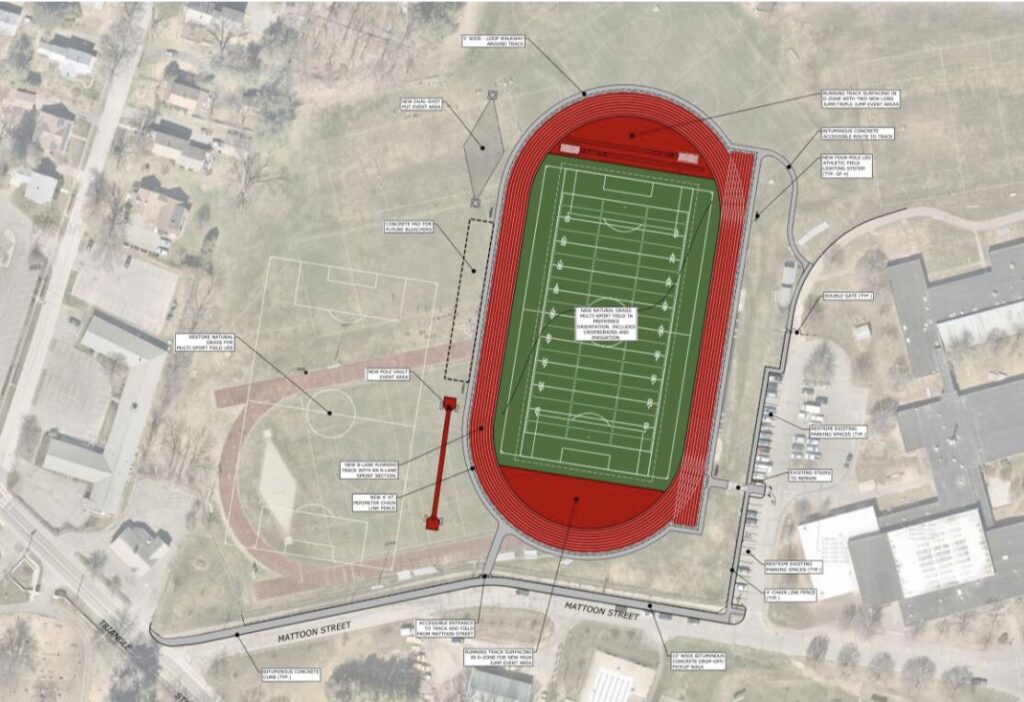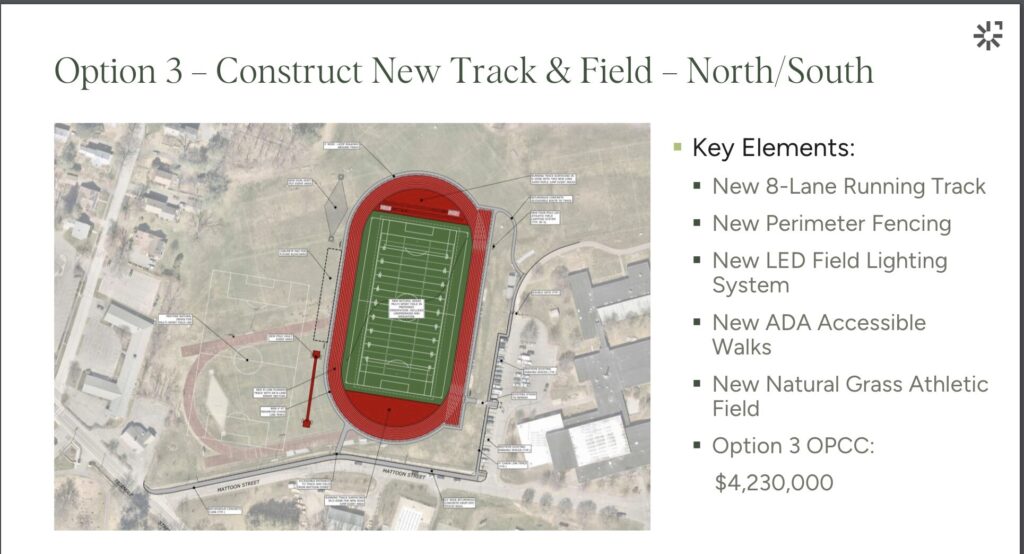Finance Committee Directs Schools to Seek CPA Funds from Towns to Help Pay for Track and Field Renovation

An eight lane track, reoriented north-south and with a natural grass infield is the preferred option for the renovation of the track at Amherst Regional High School. Photo: amherstma.gov
Report on the Meeting of the Finance Committee, June 11, 2024
This meeting was held over Zoom and was recorded.
The Finance Committee rejected releasing town funds for the high school track and field remodeling for any plan, except for the one that reorients the enclosed field in a north-south direction, even though the money on hand is almost $1 million short for that design. To make up the difference, committee members suggested delaying some aspects of the plan, such as lights and some sidewalk repair and fencing, until the additional money could be raised, preferably through the Community Preservation Act (CPA) committees of the four member towns in the region. The high school has been unable to hold home track meets for several years because of the poor condition of the track.
The committee strongly recommended against devoting more free cash to the project. Amherst’s CPA committee recently removed restrictions for an artificial turf field and north-south orientation from the $800,000 it earmarked for the project. The Finance Committee voted 4-1 to maintain the requirement for a north-south orientation for the $900,000 free cash it tagged for the project in fall 2023. In total, there is $3.47 million allocated to the project thus far.
Kevin Fuselier of SLR Consulting presented the committee with three options:
- Making the track eight lanes in its current site, adding ADA-compliant sidewalks, and grading and resodding the enclosed field. Cost estimate: $1.7 million.
- Same as option 1, but improving the drainage of the field and fully reconstructing it, as well as retrofitting LED lighting. Cost estimate: $3.4 million.
- Reorienting the track to a north-south direction, fully reconstructing the interior field and creating a second field to the west. This option also allows the track to conform to the World Athletics Association (IAAF) standards and increases the width of the enclosed field. Cost estimate: $4.2 million (design fees not included in this estimate).

The third option was preferred by all, but School Committee member Sarah Marshall said it was crucial that another season not be lost. In order to have the project complete by the fall of 2025, the town must give the design team direction by this July. Bidding would occur in the fall, and construction would be completed over the summer of 2025.
SLR has already completed a topographic survey, wetlands delineation, soil sampling, and geotechnical investigation of the site. A hydrologic analysis of the Tan Brook is ongoing, and test pits will be dug after the school year ends.
Cathy Schoen (District 1) suggested delaying some aspects, such as the lighting and football goalposts, since football games are played on another field. She asked if the conduits for the lights could be placed, but the poles and lighting added later. Fuselier said doing that would save about $350,000 of the $500,000 for lighting. She also noted that estimates for the shotput area and pole vault pit were entered twice in the third option.
Fuselier noted that the sidewalks on Mattoon Street could be redone later, as could some of the fencing. However, the second field to the west would be created with the topsoil removed from the main project, so it actually might be less expensive to use it there than having to haul the dirt away. Interim School Superintendent Doug Slaughter also stated that the school needed that additional field for its athletic teams.
CPA Committee Chair Sam MacLeod summarized his committee’s discussion saying even though they removed the north-south orientation requirement of the CPA grant by a 6-3 vote, members strongly encouraged the town to seek that design because the field will be that way for 40 or more years. CPA funds could be used for all phases of the project, but once money is allocated from another source, CPA funds cannot be used to supplant it. For a bid to be accepted, the funding source needs to be identified.
Mandi Jo Hanneke (at large) and nonvoting Finance Committee member Bernie Kubiak said they felt strongly that the three other towns in the region should contribute more to the project, but they noted these towns rarely have fall town meetings, so deliberation on additional contributions would require special town meetings to approve any new CPA allocations. Pelham and Leverett CPA committees refused to allocate funds when the project involved artificial turf, and Shutesbury never took a vote though their town meeting indicated that they would not support installation of artificial turf. Finance Committee members speculated that the other three towns might now support a project with natural grass, but that, even with those contributions, 80% of the cost would fall to Amherst.
MacLeod said that the Amherst CPA could call a meeting to discuss additional funds as soon as it received an application. Slaughter said the schools need an indication “with some level of assurance” of what plan they can pursue.
Assistant Town Manager Dave Ziomek noted that the majority preferred a north-south orientation to the field and suggested that the school choose the $4.2 million plan, but design it with alternatives that can be added as funds become available.
Finance Committee members also asked about maintenance of the natural grass field. Fuselier said that SLR educates clients about how to care for the fields. He said that some communities, such as Longmeadow, are contracting out the care of their fields at a cost of about $10,000 per acre each year. Each field is about two acres. He said that with proper maintenance, a grass field will provide about 20 hours of playing time per week. Finance Committee Chair Bob Hegner thought that field maintenance could be something that the Hurricane Booster Club could fund.
School Committee member Deb Leonard said the Regional School Committee also preferred the north-south orientation, but members worried that requiring it might further delay the project. They opted for the two less expensive options at their April 30 meeting. The recommendations of the Finance Committee will be forwarded to the full council for a vote.
Reparations
A discussion on plans for reparations to descendents of enslaved people of African heritage, as proposed by the African Heritage Reparations Assembly was postponed until the next Finance Committee meeting.
